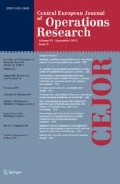Abstract
UNIRANDI is a stochastic local search algorithm that performs line searches from starting points along good random directions. In this paper, we focus on a modified version of this method. The new algorithm, addition to the random directions, considers more promising directions in order to speed up the optimization process. The performance of the new method is tested empirically on standard test functions in terms of function evaluations, success rates, error values, and CPU time. It is also compared to the previous version as well as other local search methods. Numerical results show that the new method is promising in terms of robustness and efficiency.






Similar content being viewed by others
References
Audet C, Dennis JE (2006) Mesh adaptive direct search algorithms for constrained optimization. SIAM J Optim 17:188–217
Boender C, Rinnooy Kan A, Timmer G, Stougie L (1982) A stochastic method for global optimization. Math Progr 22:125–140
Csendes T (1988) Nonlinear parameter estimation by global optimization–efficiency and reliability. Acta Cybern 8(4):361–370
Csendes T, Pál L, Sendín JOH, Banga JR (2008) The GLOBAL optimization method revisited. Optim Lett 2(4):445–454
Currie J, Wilson DI (2012) OPTI: lowering the barrier between open source optimizers and the industrial MATLAB user. In: Sahinidis N, Pinto J (eds) Foundations of computer-aided process operations. Savannah, USA
Custódio AL, Rocha H, Vicente LN (2010) Incorporating minimum frobenius norm models in direct search. Comput Optim Appl 46:265–278
Dolan E, Moré JJ (2002) Benchmarking optimization software with performance profiles. Math Progr 91:201–213
Eberhart R, Kennedy J (1995) A new optimizer using particle swarm theory. In: Proceedings of sixth international symposium micro machine and human science. Nagoya, Japan, pp 39–43
Gilmore P, Kelley CT (1995) An implicit filtering algorithm for optimization of functions with many local minima. SIAM J Optim 5:269–285
Grippo L, Rinaldi F (2015) A class of derivative-free nonmonotone optimization algorithms employing coordinate rotations and gradient approximations. Comput Optim Appl 60(1):1–33
Hansen N (2006) The CMA evolution strategy: a comparing review. In: Lozano JA, Larranaga P, Inza I, Bengoetxea E (eds) Towards a new evolutionary computation. Advances on estimation of distribution algorithms. Springer, Berlin, pp 75–102
Hansen N, Auger A, Finck S, Ros R (2009) Real-parameter black-box optimization benchmarking 2009: Experimental setup. Tech. Rep. RR-6828, INRIA
Hansen N, Auger A, Ros R, Finck S, Pošík P (2010) Comparing results of 31 algorithms from the black-box optimization benchmarking bbob-2009. In: GECCO ’10: Proceedings of the 12th annual conference on Genetic and evolutionary computation. ACM, New York, NY, USA, pp 1689–1696
Hirsch MJ, Pardalos PM, Resende MGC (2010) Speeding up continuous GRASP. Eur J Oper Res 205(3):507–521
Huyer W, Neumaier A (1999) Global optimization by multilevel coordinate search. J Global Optim 14(4):331–355
Hvattum LM, Duarte A, Glover F, Martí R (2013) Designing effective improvement methods for scatter search: an experimental study on global optimization. Soft Comput 17(1):49–62
Ingber L (1996) Adaptive simulated annealing (ASA): lessons learned. J Control Cybern 25:33–54
Järvi T (1973) A random search optimizer with an application to a max-min problem. Publications of the Institute for Applied Mathematics (3), University of Turku, Finland
Johnson S (2015) The nlopt nonlinear-optimization package. http://ab-initio.mit.edu/nlopt. Accessed July 2015
Kelley CT (1999) Iterative methods for optimization. Frontiers in applied mathematics. SIAM, Philadelphia
Liepins GE, Hilliard MR (1989) Genetic algorithms: foundations and applications. Ann Oper Res 21:31–58
Montes de Oca MA, Aydin D, Stützle T (2011) An incremental particle swarm for large-scale continuous optimization problems: an example of tuning-in-the-loop (re)design of optimization algorithms. Soft Comput 15(11):2233–2255
Moré JJ, Wild SM (2009) Benchmarking derivative-free optimization algorithms. SIAM J Optim 20(1):172–191
Nelder JA, Mead R (1965) The downhill simplex method. Comput J 7:308–313
Pál L, Csendes T (2015) An improved stochastic local search method in a multistart framework. In: Proceedings of the 10th jubilee ieee international symposium on applied computational intelligence and informatics, Timisoara, pp 117–120
Pál L, Csendes T, Markót M, Neumaier A (2012) Black-box optimization benchmarking of the global method. Evol Comput 20(4):609–639
Pošík P, Huyer W, Pál L (2012) A comparison of global search algorithms for continuous black box optimization. Evol Comput 20(4):509–541
Powell MJD (1964) An efficient method for finding the minimum of a function of several variables without calculating derivatives. Comput J 7(2):155–162
Powell MJD (2006) The NEWUOA software for unconstrained optimization without derivatives. Large scale nonlinear optimization. Springer, Berlin, pp 255–297
Powell MJD (2009) The BOBYQA algorithm for bound constrained optimization without derivatives. Tech. Rep. NA2009/06, Department of Applied Mathematics and Theoretical Physics, University of Cambridge, Cambridge
Press WH, Teukolsky SA, Vetterling WT, Flannery BP (1992) Numerical recipes in C. The art of scientific computing, 2nd edn. Cambridge University Press, New York
Rahnamayan S, Tizhoosh HR, Salama MMA (2008) Opposition-based differential evolution. IEEE T Evolut Comput 12(1):64–79
Rios L, Sahinidis N (2013) Derivative-free optimization: a review of algorithms and comparison of software implementations. J Global Optim 56(3):1247–1293
Rosenbrock HH (1960) An automatic method for finding the greatest or least value of a function. Comput J 3(3):175–184
Storn R, Price K (1997) Differential evolutiona simple and efficient heuristic for global optimization over continuous spaces. J Glob Optim 11:341–359
Torczon VJ (1997) On the convergence of pattern search algorithms. SIAM J Optim 7:1–25
Acknowledgements
This work was supported by the Sapientia Foundation - Institute for Scientific Research with the Grant No. 252/11/28/04/2015.
Author information
Authors and Affiliations
Corresponding author
Rights and permissions
About this article
Cite this article
Pál, L. Empirical study of the improved UNIRANDI local search method. Cent Eur J Oper Res 25, 929–952 (2017). https://doi.org/10.1007/s10100-017-0470-2
Published:
Issue Date:
DOI: https://doi.org/10.1007/s10100-017-0470-2




